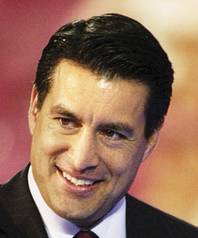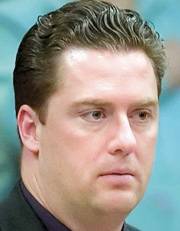Sunday, Jan. 23, 2011 | 2:01 a.m.

Brian Sandoval

John Oceguera
Sun archives
- Calls to end teacher tenure are bipartisan (9-23-2010)
In the acrimony over how to improve education in Nevada comes this argument: Teachers win job security, called tenure, long before their mettle in the rough-and-tumble world of classroom instruction has been sufficiently tested.
The law allows tenure to be granted within two years of a teacher’s employment in Nevada. The Sun has found that, over the past five years, 95 percent of new teachers in Clark County were granted tenure after just their first year in the classroom.
The Washoe County School District wants to put the brakes on granting job security so quickly. The district, which serves Reno, is asking the 2011 Legislature to pass a bill to make new teachers wait at least three years before earning “post-probationary,” or tenure, status.
The bill would also make it easier to fire teachers and administrators during those three years.
Washoe County, over the past five years, has given tenure to 88 percent of its teachers after one year.
Superintendent Heath Morrison said only two other states offer tenure to teachers after one year — Hawaii and Mississippi.
The majority have a three-year system.
“A three-year period is the appropriate amount of time to make that tenure decision,” he said. A one-year decision forces “snap judgments” that he said are not fair for either teachers or students.
Bonnie Parnell, former chairwoman of the Assembly Education Committee and former Nevada Teacher of the Year, had a visceral reaction to the numbers of teachers who get tenure after just one year on the job.
“Eww.”
“I don’t think any teacher is really able to show in the first year what they’re capable of,” she said. “Three years is a good time to observe whether they understand what’s expected of them, the demands of the job, whether they’re enjoying it.”
Nevada’s tenure law requires three evaluations in a teacher’s first year by an administrator. If the teacher is deemed “satisfactory” in all three, the administrator can recommend to the district that the teacher be granted tenure. If the teacher receives an “unsatisfactory” in one of the evaluations, or if the administrator wants to eyeball the teacher some more, the teacher is put on a second year of probation. At the end of that second year the administrator either recommends tenure or the teacher’s contract is not renewed.
Tenure has been the outgrowth of an idea that educators should be protected from arbitrary dismissal by changing school leadership or political trends.
Teachers and administrators say tenure at the K-12 level is different from that enjoyed in higher education, where it’s virtually impossible to fire tenured professors. Instead, defenders of the K-12 system say it’s about setting up due process rules to protect teachers’ rights.
The Clark County School District says it has fired 32 tenured teachers over the past five years for misconduct that includes theft, falsifying an application, falsifying student records and threatening a supervisor or co-worker.
It has not offered contracts to 171 probationary employees over the past five years because they came up short on their performance evaluations. The School District has had just over 18,000 licensed personnel each year for the past four years.
Gov. Brian Sandoval has called for an end to teacher tenure altogether, as has Assembly Speaker John Oceguera, D-Las Vegas.
Assemblywoman Debbie Smith, D-Sparks, said one year was not sufficient to evaluate a teacher.
“For so many years, we had to hire virtually every teacher the district could sign on,” she said. “Now we need to fix the system.”
The discussion on tenure reflects a larger pushback from public officials against the perceived strength of teachers and their unions. President Barack Obama’s “Race to the Top” grant competition forced states, including Nevada, to change laws and allow test scores to be linked to teacher evaluations.
Lynn Warne, president of the Nevada State Education Association, said the system works and ineffective teachers can and should be removed if they can’t improve — even after they earn tenure. “We don’t protect bad teachers,” she said.
Warne blamed administrators for waiving the second year of probation too often.
“The process that is in place is a good one,” she said. “Unfortunately, administrators do not practice and apply those procedures correctly.”
The Clark County School Administrators Association executive director, Stephen Augspurger, sees this bill as part of the larger trend to blame teachers and administrators for poor student performance, even though there is no evidence to make that link.
“What we currently have in place works well,” he said. He challenged the significance of 95 percent of first-year teachers getting tenure.
“How often should it happen?” he asked. “If it was 80 or 70 percent, would that be better? I’m not sure that’s a legitimate way to judge the system.”
Firing ineffective teachers is considered such a cumbersome process that some administrators avoid it altogether, educators say.
Steve Hill, past chairman of the Las Vegas Chamber of Commerce who serves on Sandoval’s transition team, said educators should be treated like other employers.
“Like any pool of people holding a job, some are great, some are adequate, and some shouldn’t be in that job, or not allowed to continue in the job without being retrained,” Hill said. “That’s what happens in every other occupation in the country.”
Hill said the chamber members “feel that tenure is something that should be earned after a longer period of time at a minimum and potentially be not used as a concept at all.”

Join the Discussion:
Check this out for a full explanation of our conversion to the LiveFyre commenting system and instructions on how to sign up for an account.
Full comments policy